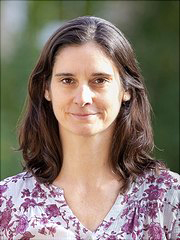Dr. Iris Vogel

Foto: UHH/Wohlfahrt
Wissenschaftliche Mitarbeiterin
Anschrift
Büro
Kontakt
Publikationen
Weitere Konferenzbeiträge
Adachi, Ryōko, Koichi Takeuchi, Ryō Murayama, Wolfgang Fanderl, Rei Miyata, Iris Vogel, Ulrich Apel und Kyō Kageura. »Development and Use of a Platform for De- fining Idiom Variation Rules“. In: Proceedings of the 5th International Language Learning Conference (ILLC 2013)«. Proceedings of the 5th International Language Learning Conference (ILLC 2013) (2013): S. 1-19.
Adachi, Ryōko, Koichi Takeuchi, Ryō Murayama, Wolfgang Fanderl, Rei Miyata, Iris Vogel, Ulrich Apel und Kyō Kageura. »簡単なイディオム簡単なイディオム異形規則の作成: プラット フォームと日本語の異形規則 (Die einfache Erstellung von Variationsregeln für Idiome: Die Plattform und Variationsregeln für das Japanische)«. Gengoshori Gakkai dai-nijūnen jidaikai happyō ronshū (2013): S. 488–491.
Iris Vogel. »Towards the encoding of multilayered information in digital lexicography«. LEXICOGRAPHY: Theoretical and Practical Perspectives. Proceedings of Asialex 2011. Hg. Akasu, Kaoru et. al.. Kyoto: The Asian Association of Lexicography, 2011, S. 594-556.
Iris Vogel. »Phraseologismen der Körpersprache im elektronischen Wörterbuch«. In: Referate des 14. Deutschsprachigen Japanologentages. Hrsg. von Martina Ebi und Robert Horres: Lit-Verlag, S.17-40) verfasst 2009, seither im Druck; pdf
Wissenschaftlicher Werdegang
Studium der Japanologie und Computerlinguistik an der Universität Heidelberg. Studienaufenthalte 1997-1999 an der Gakugei Universität und 2001-2002 an der Hitotsubashi Universität in Tôkyô. Juni 2004 bis Juni 2009 wissenschaftliche Mitarbeiterin am Seminar für Japanologie Tübingen. Januar 2009 - Dezember 2010 Mitarbeiterin am Seminar für Sprachwissenschaft im Rahmen des Projekts CLARIN.
Zwischen 2011 und 2014 hauptberuflich in der Softwareentwicklung tätig. Dissertation zum Thema »Phraseographie Japanisch–Deutsch: Lexikographische Perspektiven bei der Entwicklung digitaler Nachschlagewerke«. 2013 - 2014 Mitarbeit im Projekt »Flexible matching of Japanese collocations in a Japanese-Foreign language translation environment« der Universitäten Tübingen und Tôkyô.
Seit September 2014 wissenschaftliche Mitarbeiterin im Projekt eHumanities 2020+ der Fakultät für Geisteswissenschaften an der Universität Hamburg.
